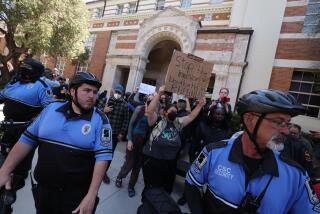Foreign ‘Voters’ Got Their Man, and Now They’re Giving Him Their Message
Europeans have always wanted to vote in U.S. elections. This year, while millions of Americans stayed home, Europeans along with the Japanese voted for George Bush--with their money and through their central banks.
On Friday, Nov. 11, the Dow fell nearly 47 points to end election week 78.47 points below its pre-election level. This was the steepest election-week decline since Harry S. Truman’s election in 1948. But, whereas Wall Street had opposed Truman and expected him to lose, Wall Street had supported George Bush. What happened?
The decline is widely blamed on the dollar, which fell 2.5% against the yen and 3% against the deutsche mark in the three days after the election. In turn, this decline was blamed on “concern” over whether Bush would be able to reduce the deficit, given his no-tax pledge.
This makes no sense at all unless foreign central banks and foreign investors were intentionally suspending judgment during the fall.
After all, there were no post-election surprises. The deficit numbers did not worsen significantly in the days immediately after the election. The arithmetic of the budget is not new. And Bush’s “read my lips” pledge against a tax increase was certainly not new. Candidate Bush and President-elect Bush have been quite explicit: no gas-tax increase, no excise-tax increases, no oil-import fee, no tax increase, no new taxes. There may have been uncertainty about many things during the campaign, and there were areas about which the President-elect said little specific, but the question of a tax increase was not one of them.
The budget numbers are equally clear. The Bush “flexible freeze” assumes that spending growth can be held to $162 billion between now and 1993. Bush’s promises of “no change in Social Security” and of inflation-only growth in defense together eat up $119 billion of that. To make the flexible freeze work means that everything else together can grow by only $43 billion. That will be hard; under current law Medicare alone will grow by nearly $50 billion. And interest rates have been rising, not falling, recently. From where comes the money for a “kinder, gentler nation”? These numbers tell most of us that the “flexible freeze” will not work. None of these numbers are new. There is no reason for the calculation to be a surprise.
Are we to believe that observant foreign investors, who watch every economic indicator in the United States, or that the foreign central banks became aware of these facts suddenly on Nov. 9 or 10? It strains credulity. No, the logical explanation is intent.
If the Dow and the dollar had fallen six months into President Bush’s term of office, we might believe that investor and central-bank actions reflected disappointment at the failure to act on the budget deficit. But to say that these actors expected action on the deficit between Nov. 8 and Nov. 10 is absurd.
During the early fall, foreign investors and foreign central banks acted to maintain calm in the financial markets. Their post-election actions bring home the underlying vulnerabilities in the U.S. economy, but their pre-election posture was designed not to raise that issue. They did not want to unsettle the American perception of peace, prosperity and economic health. Perhaps they would say that they were staying out of the campaign, that by suspending judgment and maintaining calm they avoided the debate.
That claim is disingenuous. The underlying imbalances and vulnerabilities to which the Democrats pointed were there, and recent actions show that these imbalances cause concern. By choosing to act as if they were not concerned, foreign investors and central banks voted as surely as did any U.S. citizen.
These “voters” carried more clout than the individual citizen, but we have only our own policies to blame. We have spent more than we produce, and we have borrowed abroad to make up the difference. Our foreign debt is now nearly $400 billion; we are dependent on foreign capital to fund 40% of our budget deficit. Furthermore, foreign investors have reason to keep our leash from stretching. In the 19th Century we borrowed abroad to build factories and railroads; these in turn produced wealth to repay our debt. In the 1980s we have borrowed to consume. Our creditors, despite their faith in our strength, get nervous.
Last week was a warning shot across the bow. Having voted, the Western industrial democracies wanted to tell (or remind) their chosen--and successful candidate what they expect from him. We used to call this kind of thing a political deal. Today, because we believe that it is in the nation’s interest for the new President to respond, we are more discreet. Let us support the message demanding action that foreign investors are sending, but let us remember the earlier vote as well as the current message.
More to Read
Get the L.A. Times Politics newsletter
Deeply reported insights into legislation, politics and policy from Sacramento, Washington and beyond. In your inbox three times per week.
You may occasionally receive promotional content from the Los Angeles Times.






